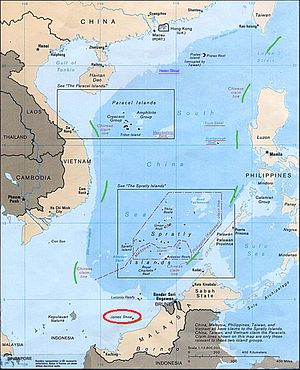Writing for Flashpoints, my colleague Prashanth Parameswaran is understandably pessimistic about the ability of a “new” multilateral maritime organization to succeed in the East Asian diplomatic milieu. The proposal discussed in Prashanth’s reflections, the Asia Maritime Organization for Security and Cooperation (AMOSC), would ostensibly attempt to create a breakthrough where a host of other international institutions and forums, including ASEAN (and its related processes, including the +3, ADMM, and ARF), have failed. Prashanth gets at a point in his thoughts that I want to state more overtly here: the problem with Asia’s institutions failing to address maritime security issues seriously has nothing to do with the quality or processes of these institutions; the problem stems from widely divergent national interests, particularly between China and other states with maritime interests and claims.
Before you rush to the comments to praise/denounce that assertion as true/false, consider that China’s role in any process to “solve” maritime disputes, in the South China Sea, for example, is central. Beijing’s claim to the waters and land features of the South China Sea is the most capacious by far, as seen in its dashed-line claim to almost the entirety of the sea. Additionally, Beijing’s preference for dealing with disputes diplomatically in bilateral forums over multilateral settings is well-known. Multilateral efforts at merely alleviating practical issues in the South China Sea dispute, such as the ongoing process on a code of conduct for Southeast Asian states and China in the South China Sea, have been entirely rendered stagnant due to Chinese recalcitrance. Most recently, the Chinese delegation to a preparatory meeting for this year’s ASEAN Defense Ministers Meeting Plus (ADMM-Plus) refused to allow South China Sea issues onto the agenda. Simply put, on a two-axis chart charting state preferences for multilateralism vs. bilateralism on the horizontal axis and cooperation vs. competition on the vertical when it comes to Asian maritime issues, Chinese preferences are almost certainly in the bottom-left quadrant.
Leaving aside the details of AMOSC’s agenda or bureaucratic setup, Southeast Asia just isn’t primed for a productive multilateral diplomatic process on these tough issues. Although China is the main inhibitor to successful multilateralism, its position on maritime issues is perfectly understandable from a national interest perspective. As Shannon noted recently over at China Power, China sees itself playing “catch-up” in the South China Sea, attempting to exploit the same economic and strategic gain that several Southeast Asian states have enjoyed for decades. Reverting to rudimentary principles in international relations theory, such as state behavior being driven by rational self-interest, it is easier to appreciate why Beijing isn’t keen to rush to the multilateral negotiating table on these maritime issues.
Still, I don’t think this is an issue of time. Do I think that China will become a more amicable party in South China Sea maritime negotiations once it enjoys the same access to the region’s resources and strategic features as other states? No. It will still have little to gain from participating in good faith in a multilateral process that limits its ability to exercise sovereignty over this region. Short of an unpredictable intervening variable (such as a serious collapse in the Chinese economy or a Chinese defeat in a major military conflict), China will continue to oppose attempts to “internationalize” the South China Sea issue.
Given all this, AMOSC’s mandate of preventing and managing “existing maritime disputes between countries by enhancing domain awareness, improving capacity-building, and enacting confidence-building measures” will likely turn up dead-on-arrival. As long as China sees no convincing rational reason for it to pursue multilateralism, it will continue to at best, pursue lopsided bilateral negotiations, and, at worst, scuttle the issue off diplomatic agendas entirely. Making matters worse, China currently commands considerable economic and political leverage over various ASEAN states, reducing the ability of the group of 10 nations to come together on matters of strategic importance on maritime issues. If ASEAN states, particularly those with maritime disputes among themselves, were able to convene a successful multilateral process, resolve their own disputes, and consolidate their understanding of maritime issues, I would be considerably more optimistic about a multilateral process on disputes involving China.

































